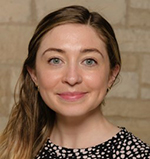The Call of a Circular Economy
Maria Keane (MSES ‘22) considers her job more of a calling than a career.
Keane is the senior circular economy technical manager at Energetics, a full-service technical and management consulting company specializing in energy and infrastructure resilience.
 “Pursuing a career in energy and sustainability is an opportunity to be part of something much larger than ourselves,” said Keane, who has been with Energetics for nearly two years. “Each of us has the potential to make a meaningful impact on the world, whether it’s through innovative solutions in the circular economy, advocating for sustainable practices, or pushing for policies that foster a greener future.”
“Pursuing a career in energy and sustainability is an opportunity to be part of something much larger than ourselves,” said Keane, who has been with Energetics for nearly two years. “Each of us has the potential to make a meaningful impact on the world, whether it’s through innovative solutions in the circular economy, advocating for sustainable practices, or pushing for policies that foster a greener future.”
Keane is realizing that potential thanks to Northwestern's Master of Science in Energy and Sustainability (MSES) program, where she developed a firm understanding of the circular economy and the possibilities it brings. MSES is jointly offered by Northwestern Engineering and the Paula M. Trienens Institute for Sustainability and Energy.
The circular economy seeks to keep materials and products in use for as long as possible, breaking the mold on the traditional “take-make-dispose” model. The goal is to extend the life of products by redesigning them to last longer or to find new ways to reuse, repair, refurbish, or recycle them once they reach the end of their initial intended purpose.
Success means making the most of finite resources and giving humanity a better shot at a longer, happier, healthier future.
“The goal is to reduce waste, conserve resources, and lower environmental impacts like energy consumption and emissions,” Keane said. “It’s all about creating a more sustainable and efficient system that loops materials back into the economy instead of sending them to a landfill.”
Keane’s current role primarily supports the US Department of Energy’s (DOE) Advanced Materials and Manufacturing Technologies Office and its program on secure and sustainable materials. She works closely with stakeholders across government, national labs, academia, and industry to solve the most high-impact challenges within the circular economy.
One resource Energetics created for the DOE is TECHTEST, short for the Techno-Economic Energy and Carbon Heuristic Tool for Early-Stage Technologies. TECHTEST integrates life cycle assessment (LCA) and techno-economic analysis (TEA) methods, allowing users to model the lifetime impacts of both products and processes. It’s designed to help a wide range of stakeholders — from companies to research organizations — compare novel technologies to their commercial benchmarks. For example, if a company has a new idea, they can use TECHTEST to estimate potential cost, energy, and emissions savings and assess how their innovation stacks up against existing solutions.
One of Keane's key roles at Energetics is to provide technical assistance to ensure strategic alignment. To do that, she relies on lessons learned in MSES.
Keane was initially drawn to the program to learn from faculty who were actively working in the field.
“For a degree like energy and sustainability, that real-world perspective is so important because these areas are constantly evolving,” she said. “It was really cool to learn from such smart and knowledgeable people who had experience beyond the academic setting.”
Keane applies her MSES learning daily in her work at Energetics. She said the program helped her understand the interconnected relationships among materials, processes, and stakeholders. That understanding improved her ability to analyze the complex problems at the heart of sustainability initiatives and more easily find solutions that address short-term goals while not increasing negative long-term impacts.
The MSES program also showed her the importance of staying current in a quickly evolving industry.
“There are a lot of exciting initiatives and new regulations coming out that relate to energy and sustainability, so it’s really important to know what’s going on in the world,” she said. “The program equipped me with the tools to adapt and continue learning.”
Now, Keane hopes more bright minds follow her through the MSES program and into a career promoting sustainability.
“The world needs passionate changemakers,” she said. “These contributions can help shape a more sustainable and equitable future for generations to come.”